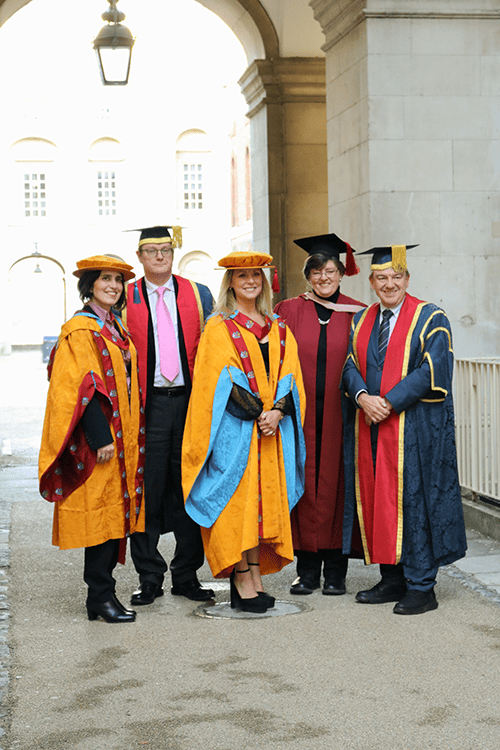
When chef and broadcaster Anna Haugh received an honorary doctorate from the Natural Resources Institute, part of the University of Greenwich, she described the moment as deeply meaningful.
“I couldn’t believe they wanted to give it to me,” she said. “It’s such an honour. I come from a very working-class background. I’m not naturally academic, but I have a good business mind and a strong work ethic. Getting an honorary degree that’s connected with the job I do – it feels like not always knowing you’re on the right road, but in the long run it leads you to where you're meant to be.”
Though best known for her fine dining restaurant ‘Myrtle’ and her appearances on television, Haugh’s vision for her career has always been broader than the kitchen. “At first, all I wanted to do was learn how to cook. But now, my biggest goal is how can we improve people’s lives? I believe it starts with dignity – through their approach to food and taking care of themselves.”
That ethos came through clearly in her collaboration with the University of Greenwich on a set of affordable, nutritious recipes. One example is a plant-based pulled pork alternative made from banana skins – an inventive and nutritious use of an ingredient most people throw away. “There’s fibre in there, and we need more nutrition and more fibre in our diets,” she said. “It’s a recipe that makes people think, ‘I can do that. I can afford that. And it’s interesting.’ That’s so important, because dignity is a really important word, especially when you don’t have a lot of financial resources, time, or skills.”
Haugh believes that a chef’s skills can and should be used to make food more accessible. “People like me, who’ve trained in Michelin-starred kitchens, have the brains to take simple, relatable ingredients and make recipes that work and are needed.”
Her views on sustainability are shaped by both experience and heritage. “I was raised with no waste,” she said. “My mother taught us how to make jams, chutneys, how to preserve food without freezing. She taught me to look for the freshest tomato, the best mushroom, and to cook everything from scratch. That’s all part of sustainability.”
In her kitchen at Myrtle, these values guide both food preparation and team culture. “I don’t discipline my staff if they waste something. I help them understand they’re in control of their section. You don’t want to waste your time, your energy, or your ingredients. Leftovers become staff meals or fuel for experimentation. We never have bins full of food at the end of the day.”
For Haugh, sustainability isn’t about perfection, it’s about small, thoughtful steps. “It’s not about saying you’ll never use a plastic bag again,” she said. “It’s about eating fewer ultra-processed foods, buying fresh where you can, cooking at home, using what you have, and storing it well. All of that reduces waste. And when you’re taking care of yourself like that, it has a chain reaction.”
She also spoke passionately about the importance of education, not just in food, but in shaping the future. Reflecting on the graduation ceremony where she received her degree, she said, “I felt really special on the day, but I also loved watching the students come up and accept their achievements. I saw all these young, vibrant people from different backgrounds. They don’t realise that as they’re collecting their scrolls and thinking this is the result of all my hard work, that they’re also collecting the future for all of us.”
As a mother, the day had added resonance. “My son is nearly four and ready for school. Like my father hoped for me, I hope he’ll go to university. Because it’s not just about the degree, it’s about the exposure, the connections, the future you create for the country.”
Reflecting on the ceremony, Haugh shared, “I felt really special, and honestly, I didn’t feel like I deserved it.” It’s a characteristic moment of humility from a chef who has spent decades championing food with purpose. “It is such an honour to get the award,” she added, “but also to watch all the students come up and accept their hard-earned achievements.”
For Haugh, the day was not only a personal milestone but a reminder of the broader impact of education and dedication, values she herself embodies through her work in sustainable food and community health.
In the end, her message is simple but powerful: sustainability isn’t just about ingredients or packaging. It’s about people – how they live, eat, and look after one another. And that’s a message the Natural Resources Institute is proud to share.

